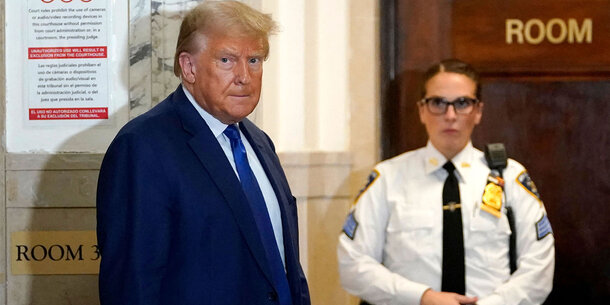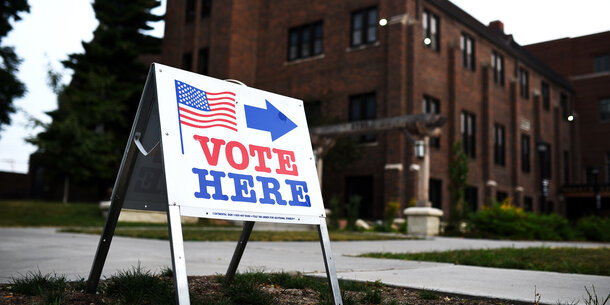Update July 1, 2020: The 11th Circuit Court of Appeals has agreed to hear the case and it stayed the district judge’s order until it rules.
A federal court ruled Sunday that a law requiring people to pay off fees and other costs related to a past felony conviction before their voting rights are restored is unconstitutional. The decision makes clear that hundreds of thousands of Floridians who were barred from voting by the law are in fact eligible to vote.
In 2018, Florida’s voters passed Amendment 4, which automatically restored voting rights to people when they complete their sentence. But Florida lawmakers and Gov. Ron DeSantis responded by enacting a law to undermine the ballot measure. An expert report submitted to the court showed that the law’s requirements would prevent at least 770,000 people from voting — and it would hit Black Floridians the hardest.
The League of Women Voters of Florida, the Florida State Conference of the NAACP, the Orange County Branch of the NAACP, and 12 would-be voters filed a lawsuit to challenge the law. The Brennan Center is representing the plaintiffs, along with the American Civil Liberties Union, the NAACP Legal Defense and Educational Fund, the ACLU of Florida, and the law firm Paul, Weiss, and our suit was consolidated with similar cases filed by others.
The court issued a preliminary injunction last October, ruling Florida could not deny voting rights to people who could not afford their fees and court costs. The state appealed, but the 11th Circuit Court of Appeals upheld the decision in February. (The state has indicated that it will appeal Sunday’s ruling as well.)
On April 27, the case went to trial, which was conducted entirely by videoconference due to the coronavirus pandemic. Now, the court’s historic and forceful opinion paves the way for Amendment 4 to truly take effect in all its glory before the November elections.
The court’s findings
Sunday’s decision expands the preliminary injunction and contains a number of important rulings.
First, the court reiterated that requiring people to pay to vote even when they cannot afford what they owe is unconstitutional wealth discrimination. The court found that an “overwhelming majority” of the hundreds of thousands disenfranchised by the law fall into that category.
Despite the incredibly high rates of unemployment and poverty among returning citizens, Florida heaps debt on them. In 2018 alone, Florida’s criminal courts assessed over $250 million, and the state had admitted that it doesn’t even expect the vast majority of it to be paid anytime soon. By making people pay to vote, DeSantis and the Florida Legislature ensured that permanent disenfranchisement would continue for hundreds of thousands simply because they are too poor.
Second, the court ruled that the law violates the 24th Amendment, which bans the poll taxes that were used to disenfranchise African Americans for decades after the Civil War. The court held that court fees meet the definition of a “tax” under the amendment because they are intended to raise revenue. Indeed, Florida’s constitution actually requires the state’s courts to be financed entirely by charges imposed by the courts.
The court’s holding that the law violates the amendment is momentous: It is one of the only times a court has struck down a law for violating the 24th Amendment since it was ratified in 1964, and the first time in the context of rights restoration for people with convictions. It also illustrates just how far out of step Florida’s system is with our nation’s longstanding values. As the court put it, “taxation without representation led a group of patriots to throw lots of tea into a harbor when there were barely united colonies, let alone a United States.”
Finally, the court addressed the “administrative train wreck” that the law created. Florida lacks a reliable system for determining how much a person owes. Indeed, Florida hadn’t just put a price tag on voting — it created a system where returning citizens couldn’t even tell what the price is. The court made clear that it is unconstitutional to deny someone the right to vote for failure to pay “amounts that are unknown and cannot be determined with diligence.”
Our client, Pastor Clifford Tyson provides a perfect example of this problem. He has not been able to get a definitive answer about what he owes even after the local county clerk’s staff — which the court described as “extraordinarily competent and diligent” — studied his records for hours.
And Tyson is not alone. Expert witness Traci Burch found that even if a citizen clears the plethora of bureaucratic hurdles to getting records, inconsistencies in the records are rampant across the state.
A returning citizen who cannot determine whether they owe money faces the possibility of prosecution for a felony if they register and vote and it turns out they are ineligible due to a debt they did not unearth. The court’s order gives them the clarity they need to register and vote without fear, even providing a one-page set of standards to guide them.
Anyone with a felony conviction (besides murder or a sexual offense) who has completed any period of government supervision can vote unless they owe fines or restitution that they can ascertain, and they can afford. To simplify things, the court also made clear that some people, including anyone who was appointed a public defender, are presumptively unable to afford what they owe.
Ensuring the right to vote, in principle and practice
The court went further and provided a workable process for people who are still confused — something the state has utterly failed to do in the year since the law was passed.
The judge prohibited the state from using the confusing registration form required by the law. The court described the form, which required people with convictions to affirmatively disclose that fact in order to register, as “indefensible,” and ruled that it violated the National Voter Registration Act.
The court even questioned lawmakers’ intention in requiring the new form, saying it is “so obviously deficient that its adoption can only be described as strange.” The simple form Florida used before the law was passed will make it much easier for people to register without fear.
The judge also wrote that anyone who is still confused about their eligibility can ask the state for an advisory opinion about whether they need to pay — and even provided a form for making such a request. In other words, they can ask the state to tell them if they owe any fines and restitution, how much they owe, and to give them an answer about whether they qualify as unable to afford what they owe. If the state does not give them an answer within 21 days, they are free to register and vote.
In sum, the decision confirms that it is unconstitutional to put a price tag on voting rights restoration. It also ensures that every eligible voter is free to register and vote without fear.






